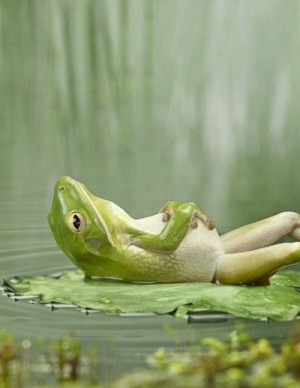As it turns out, rest is an essential part of working well and working smart. Even when the human brain is in a resting state, it is still actively engaged in its "default network" which is plugging away at problems, looking for and tossing out possible answers, and searching for new information. When we learn to rest better, we can support our brain, let it do its work, and take notice when it uncovers something that deserves our attention. It might be helpful to think of rest as something similar to singing or running . We all know how to do these things, but with a little work and understanding, we can learn to do them better. Here are some ways you might use rest to benefit your thinking and creativity.
1. Start an early morning routine. Many of history's most creative and prolific figures were early risers. Working on your most difficult and/or challenging problems first thing in the morning can be of big benefit because creative energy is at its peak then. Putting them off until later sometimes can't be avoided but when you can, tackle your biggest problems as early as you can.
2. Walking. It's been found that walking can a simple way to get your creative juices flowing. Walking isn't just a good exercise, it is also helps the brain engage in a kind of light focus which encourages mind-wandering which aids creativity later. Recent studies at Stamford University have shown that walking and being outside can lead to better performance. Walking on a treadmill doesn't work the same way. Walking can aid you in solving problems at work, especially if you go for a walk while the problem is still fresh in your mind. Walking isn't as good for analytical thinking as it is for creative thinking, however. Charles Darwin thought that walking was so valuable as a creative stimulus, that he built a thinking "thinking path" near his house and would go walking there whenever he encountered a challenging problem.
3. Napping. An afternoon "cat nap" can be very restorative, especially if you do creative and imaginative work over long periods of time...or in a very demanding environment (like advertising and marketing businesses). The obvious benefits of napping are increasing alertness and decreasing fatigue. It's been shown that even a 20-minutes nap can boost your brain's ability to concentrate by giving it a chance to restore depleted energy. A recent study has shown that "nappers" perform better on tests later in day and evening compared to those who don't nap. And napping can help help you perform better on certain tasks than caffeine can. I was surprised to learn that an early nap can actually improve your REM sleep and boost creativity, while a later nap will provide better slow-wave sleep and will be more physically restorative.
4. Stopping at the right time. Working long hours produces stress, burnout, and poorer performance on the job. It's also a killer of creativity and imagination. An effective solution for this is learning to stop working at just right time. So when is "the right time?" It's when you know what your next move will be. Stop then, and leave it for tomorrow. One of my favorite authors, Ernest Hemingway, once said, " Always stop when you know what's going to happen next." Too, stopping when you still have a little energy left will make it easier to get started again tomorrow. Current research is showing that consciously leaving leaving tasks undone will help to prompt your mind to keep working on the task even without your conscious awareness.
5. Sleeping. This is, of course, the ultimate form of relaxation. It's very important for everyone to get good, beneficial sleep. But for those of us who do creative work, it seems to be even more important. Many researchers have shown that REM sleep is necessary for good performance. A deficit of only one hour of sleep per night can lead to a greater loss of work performance than those who get enough, good-quality sleep.
When we learn to treat rest as work's equal partner and recognize it as a "playground for the creative mind and springboard for innovation and new ideas, rest becomes something valuable....and not something to beat yourselves up over doing. Even for those who do not engage in paid creative work, modern life requires us to constantly be creative; to find new and better ways of living our lives. Humans are inherently creative beings. Learn to take a break and to be okay with it. Children use their creativity all the time. And they takes naps. That's no small coincidence. "The creative adult is the child who survived."
On that note, I think I'll go and take a little nap...

 RSS Feed
RSS Feed